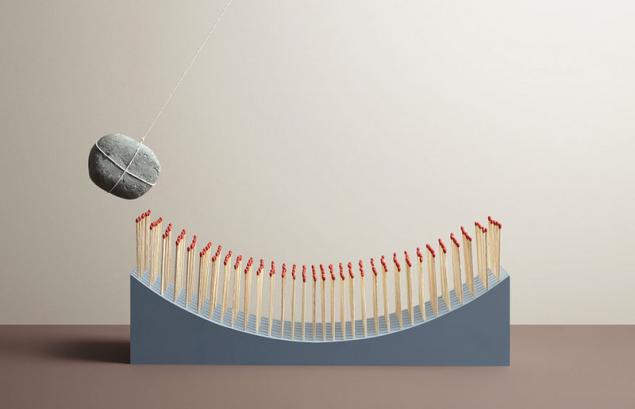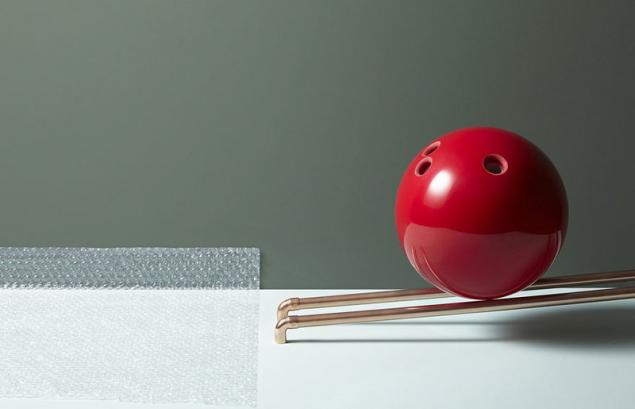547
It's a heady feeling: the role of adrenaline in our lives
This article focuses on the adrenaline and its role in our lives. Photographer Aaron tilley (Tilley Aaron) and Director Kyle Bean (Kyle Bean) specially recreated in photographs moments of anxiety like this when something was about to happen something terrible.
The project underlines the curious relationship between the perception of the mind and the body's response. The mere anticipation of an upcoming event causes the release of adrenaline, even if in fact nothing has happened yet.
In suspense
From the characteristic of the heartbeat and the flood of feelings that appears in the breast and spreads to your fingertips, until the spasm in the muscles, and rapid breathing: it is the effects of adrenaline that we feel physically in your body, but they actually begin in our brain.

There is a curious relationship between what the mind perceives and how it reacts to the body. Adrenaline affects our autonomic nervous system, when it is expected that something bad happens, even if nothing has happened. This hormonal surge is an integral survival tool of our ancient ancestors who had to fight or run, defending against the immediate threats. These bursts are preparing our body to danger, ahead of the impending event and our response to it. Otherwise, man could not survive a saber-toothed tiger.

Adrenaline effects on the physical level, we owe to your adrenal glands. When there is a stressful situation, there is a feeling of fear and danger, neuroendocrine cells of the adrenal medulla produce a powerful hormone called epinephrine, better known as adrenaline.
But the human mind is a powerful thing. We have the ability to induce the same inner whack just by thinking about the disturbing moment, and not living it in reality. If you are preparing to ask for a raise, think coming soon the steep downhill ski slope, or brace myself to get a date with a super cute boyfriend/girlfriend – all these stressful situations that the brain perceives as well as a free fall from a height of 2000 meters. Even if at this time you are sitting at the kitchen table and sipping tea.
In the documentary film "Adrenaline: the science of risk" (2002) says that man is the only creature that puts herself in mortal danger in pursuit of a pleasant pastime.
But not everybody is overjoyed about it. Someone takes pleasure in sitting at home and solving crossword puzzles from the Sunday paper, and someone to complete the sensation will certainly need to conquer the granite monolith Half dome in Yosemite.
Fortunately, the adrenaline surge can be felt, not exposing themselves to real dangers.

In the modern world instead of escape from wild animals, a new generation of thrill-seekers actively gets the same experience through innovative ways – artificially. No need to put themselves at risk when there are safer options similar stimuli.
Many digital platforms provide an opportunity to experience the thrill of being far from the epicenter of events. We have available a veritable smorgasbord of emotions: the fear of horror movies Netflixing, adventure with a professional mountain climbers on Instagram or broadcast of the NBA finals on any website.
Honestly, when there are no enemies, no need to fight for survival, daily life is getting a bit... boring. Despite the fact that it is convenient, the same route, the same established order of Affairs in the same city eventually loses its luster.
Previously, most people only in their own dreams could happen in the unknown lands, and now many people turn such dreams into reality, documented and spread on the Internet, sharing their achievement with the world.

Feeling the need for adrenaline, you can get a thrill just from watching other people's adventures. Here, the key factor – empathy, empathy current emotional state of another person. The experience of someone's experiences can be incredibly powerful. And all you need is an Internet connection. You will immediately satisfy the thirst of adrenaline, without leaving the couch.
The desire for an indirect test of adrenaline is not a new phenomenon. When the television broadcast the landing on the moon spacecraft "Apollo 11" in 1969, the television clung 600 million people. Experiencing the awe and anxiety, they looked at grainy footage.
Four decades later, we can still stimulate your synapses, reviewing this historical event at least the hundredth time in an extended HD format. In other words: you do not have to become an astronaut, to feel in the space.

Remember 2012, when the spacecraft Curiosity made a soft landing on the surface of Mars, as if in some science fiction movie. A large quantity of people were watching this extraordinary event in real time with the same sweaty palms and a sinking heart, as NASA engineers in the jet propulsion Laboratory near Pasadena, which is responsible for the interplanetary journey of the Rover.
Most people have never been on the moon, and it will take a little time before humanity will make this opportunity widely available. But technology has allowed us to go where few have visited, or had not gone before, be it outer space or the path of cheetahs in the Serengeti.
You can relive the moments that seem inconceivable in your life. But when you look at it, the feeling makes you realize that even the wildest dreams are actually attainable. Thus, passive surveillance may encourage the viewer to tear yourself off the couch and move to the same personal maximum.

Whether you're preparing for the upcoming exciting event, or just imagining that you are taking part in it, the thrill of anticipation is sometimes comparable to the final award. Often she only thought about "what if..." is as powerful as the thing itself in reality.
Also interesting: Food slavery with the scent of freedom
The poison that lives in Your brain 3 years
That intoxicating feeling that bubbles inside before the fear takes ahold of you, helps to open your personal thirst for life. And no matter how you experience it: watching someone else's adventures or held breath of your deepest dive.published
Author: Jordan Kushins (Jordan Kushins)
P. S. And remember, just changing your mind — together we change the world! ©
Join us in Facebook , Vkontakte, Odnoklassniki
Source: cameralabs.org/9927-v-trevozhnom-ozhidanii-adrenalin-i-ego-rol-v-nashej-zhizni
The project underlines the curious relationship between the perception of the mind and the body's response. The mere anticipation of an upcoming event causes the release of adrenaline, even if in fact nothing has happened yet.
In suspense
From the characteristic of the heartbeat and the flood of feelings that appears in the breast and spreads to your fingertips, until the spasm in the muscles, and rapid breathing: it is the effects of adrenaline that we feel physically in your body, but they actually begin in our brain.

There is a curious relationship between what the mind perceives and how it reacts to the body. Adrenaline affects our autonomic nervous system, when it is expected that something bad happens, even if nothing has happened. This hormonal surge is an integral survival tool of our ancient ancestors who had to fight or run, defending against the immediate threats. These bursts are preparing our body to danger, ahead of the impending event and our response to it. Otherwise, man could not survive a saber-toothed tiger.

Adrenaline effects on the physical level, we owe to your adrenal glands. When there is a stressful situation, there is a feeling of fear and danger, neuroendocrine cells of the adrenal medulla produce a powerful hormone called epinephrine, better known as adrenaline.
But the human mind is a powerful thing. We have the ability to induce the same inner whack just by thinking about the disturbing moment, and not living it in reality. If you are preparing to ask for a raise, think coming soon the steep downhill ski slope, or brace myself to get a date with a super cute boyfriend/girlfriend – all these stressful situations that the brain perceives as well as a free fall from a height of 2000 meters. Even if at this time you are sitting at the kitchen table and sipping tea.
In the documentary film "Adrenaline: the science of risk" (2002) says that man is the only creature that puts herself in mortal danger in pursuit of a pleasant pastime.
But not everybody is overjoyed about it. Someone takes pleasure in sitting at home and solving crossword puzzles from the Sunday paper, and someone to complete the sensation will certainly need to conquer the granite monolith Half dome in Yosemite.
Fortunately, the adrenaline surge can be felt, not exposing themselves to real dangers.

In the modern world instead of escape from wild animals, a new generation of thrill-seekers actively gets the same experience through innovative ways – artificially. No need to put themselves at risk when there are safer options similar stimuli.
Many digital platforms provide an opportunity to experience the thrill of being far from the epicenter of events. We have available a veritable smorgasbord of emotions: the fear of horror movies Netflixing, adventure with a professional mountain climbers on Instagram or broadcast of the NBA finals on any website.
Honestly, when there are no enemies, no need to fight for survival, daily life is getting a bit... boring. Despite the fact that it is convenient, the same route, the same established order of Affairs in the same city eventually loses its luster.
Previously, most people only in their own dreams could happen in the unknown lands, and now many people turn such dreams into reality, documented and spread on the Internet, sharing their achievement with the world.

Feeling the need for adrenaline, you can get a thrill just from watching other people's adventures. Here, the key factor – empathy, empathy current emotional state of another person. The experience of someone's experiences can be incredibly powerful. And all you need is an Internet connection. You will immediately satisfy the thirst of adrenaline, without leaving the couch.
The desire for an indirect test of adrenaline is not a new phenomenon. When the television broadcast the landing on the moon spacecraft "Apollo 11" in 1969, the television clung 600 million people. Experiencing the awe and anxiety, they looked at grainy footage.
Four decades later, we can still stimulate your synapses, reviewing this historical event at least the hundredth time in an extended HD format. In other words: you do not have to become an astronaut, to feel in the space.

Remember 2012, when the spacecraft Curiosity made a soft landing on the surface of Mars, as if in some science fiction movie. A large quantity of people were watching this extraordinary event in real time with the same sweaty palms and a sinking heart, as NASA engineers in the jet propulsion Laboratory near Pasadena, which is responsible for the interplanetary journey of the Rover.
Most people have never been on the moon, and it will take a little time before humanity will make this opportunity widely available. But technology has allowed us to go where few have visited, or had not gone before, be it outer space or the path of cheetahs in the Serengeti.
You can relive the moments that seem inconceivable in your life. But when you look at it, the feeling makes you realize that even the wildest dreams are actually attainable. Thus, passive surveillance may encourage the viewer to tear yourself off the couch and move to the same personal maximum.

Whether you're preparing for the upcoming exciting event, or just imagining that you are taking part in it, the thrill of anticipation is sometimes comparable to the final award. Often she only thought about "what if..." is as powerful as the thing itself in reality.
Also interesting: Food slavery with the scent of freedom
The poison that lives in Your brain 3 years
That intoxicating feeling that bubbles inside before the fear takes ahold of you, helps to open your personal thirst for life. And no matter how you experience it: watching someone else's adventures or held breath of your deepest dive.published
Author: Jordan Kushins (Jordan Kushins)
P. S. And remember, just changing your mind — together we change the world! ©
Join us in Facebook , Vkontakte, Odnoklassniki
Source: cameralabs.org/9927-v-trevozhnom-ozhidanii-adrenalin-i-ego-rol-v-nashej-zhizni























